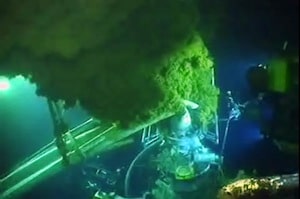The U.S. Department of Justice has launched an official investigation to determine whether or not BP lied to the public and to the government about the amount of oil that was leaking from a broken pipe during last year’s Gulf of Mexico oil disaster. The leak was the result of the explosion and subsequent sinking of the Deepwater Horizon oil rig, owned by Transocean but operated by BP.
During the initial days of the oil leak, BP was constantly updating their estimates of how much oil was flowing out of the broken pipeline. In spite of their advanced camera, computer, and other data technologies, they were somehow never able to give an accurate, or even close to accurate, account of what was happening beneath the water’s surface. The Justice Department is hoping to find out whether the company was acting dishonestly, or if they actually couldn’t determine the flow rate despite all the data available to them.
From a lengthy Huffington Post report on the investigation:
According to federal officials, BP was solely responsible for producing the very first spill estimate of 1,000 barrels per day, a figure which led to a sense of complacency about the seriousness of the event among some federal and state responders at the outset of the disaster, the presidential commission on the oil spill concluded in January 2011. BP has never publicly acknowledged generating this figure and even the commission’s investigators could not determine the methodology used to produce it.
Documents and interviews also indicate that BP, using reservoir data, computer modeling and imagery of the leaking pipe, may have had the ability to calculate a far more accurate estimate of the well’s flow rate early on in the spill than it provided to the government. The company either never fully ran those calculations or their results were not disclosed to federal responders.
Obviously, it would have been in the company’s own best interest to convince the public that the disaster was smaller than it actually was, as the company was facing environmental fines of up to $4,300 per barrel of oil leaked into the Gulf. But it is hard to believe that BP couldn’t get an accurate count of what was coming out of that broken pipe, or even a reasonable rough estimate. After all, the company boasted in 2008 that they had developed technology that was capable of determining the flow rate of oil through a broken pipe – the very situation that was happening in the Gulf. They invented the technology, bragged about it, but when it would have actually been useful to deploy, BP claimed they couldn’t accurately measure the flow rate, and thus the scope of the disaster.
There’s no question that this investigation is a fantastic start. Especially when you consider that our current DOJ has spent more time investigating John Edwards’ extramarital affair than they have investigating the Wall Street bankers whose actions helped bring down our economy. On top of that, we have an Attorney General who spent most of his career defending oil companies, pharmaceutical companies, and Wall Street banks – the same suspects we’re supposed to trust him to investigate. So this investigation is certainly a step in the right direction, but it needs to go much, much deeper than BP’s flow number irregularities.
To begin with, the DOJ needs to look into what was happening at the oil company before the Gulf disaster even occurred. Reports show that the company calculated the cost of safety measures for oil rigs versus the cost (value) they put on a worker’s life. Internal documents obtained by The Daily Beast show that BP called this analysis the “Three Little Pigs” scenario. After they realized that it was more cost-effective to pay losses to the families of injured workers, they opted to forgo certain safety measures. This is clearly an area where the Justice Department should focus significant attention.
The Justice Department should also look hard into the aggressive misinformation campaign that BP launched during the oil leak. After the Deepwater Horizon rig explosion, BP sent its PR machine into overdrive trying to misdirect the public about what was happening in the Gulf of Mexico.
Leaked BP emails show that the company actively attempted to “buy” scientists near the Gulf Coast, in order to produce favorable reports on the impact the oil would have on the environment. This tactic would have also prevented these scientific experts from later testifying for plaintiff’s attorneys representing oil disaster victims, as their payments from BP would have provided a significant conflict of interest.
BP’s campaigns stretched far beyond buying scientists. The oil giant launched an aggressive online ad campaign, spending a staggering $3.7 million in just one month on Google AdWords relating to the oil spill – BP bought relevant search terms such as “oil spill,” “leak,” and “top kill.” Buying these search terms gave BP an online advantage, as it put their sponsored links (most of which are still active today) ahead of relevant news stories and other information relating to the oil disaster in a web search.
After the online ad campaign took off, the company then began their “grassroots” efforts. Two industry-funded organizations went into heavy action: The Gulf of Mexico Foundation and the America’s Wetland Foundation. The Gulf of Mexico Foundation pulled its board of directors from the oil industry, and most members of the board were either actively working for oil companies, or for offshore oil drilling interests. America’s Wetland Foundation was even less discrete than hiring an oil industry board of directors – they took funding directly from the oil industry, including: Shell, Chevron, the American Petroleum Institute, Citgo, Entergy, and Exxon Mobil.
BP also donated $5 million to the Dauphin Island Sea Lab in July 2011, 3 months after the oil leak began. After this cash infusion, the Sea Lab released a report claiming that the massive dolphin deaths in the Gulf of Mexico were being caused by the cold water, not the oil and Corexit that BP poured into the waters. Scientists at the National Oceanographic and Atmospheric Administration pointed out that dolphins actually swim away to avoid cold water.
Companies across the globe have been fined for misleading the public on a variety of issues. As the above clearly shows, BP actively set out to mislead the public in numerous ways regarding the Gulf of Mexico oil disaster. These are active misinformation campaigns that continue to this day. Until the Justice Department looks into all of these matters, it is unlikely that the misinformation from BP is going to stop any time soon.
Subscribe to our newsletter
Stay up to date with DeSmog news and alerts







